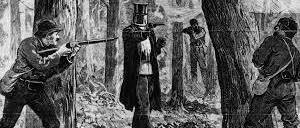Ned Kelly: Outlaw of the Outback
Posted on 24th April 2021
Few have better come to represent the Australian character in the collective imagination, the irreverence and the disdain for authority than the man known to history as Ned Kelly, a thief and a murderer who would hang for his crimes.
Or was he as some believe misunderstood, a victim indeed who stood up for the common man who was both a rebel and a hero. Either way, his legend lives on.
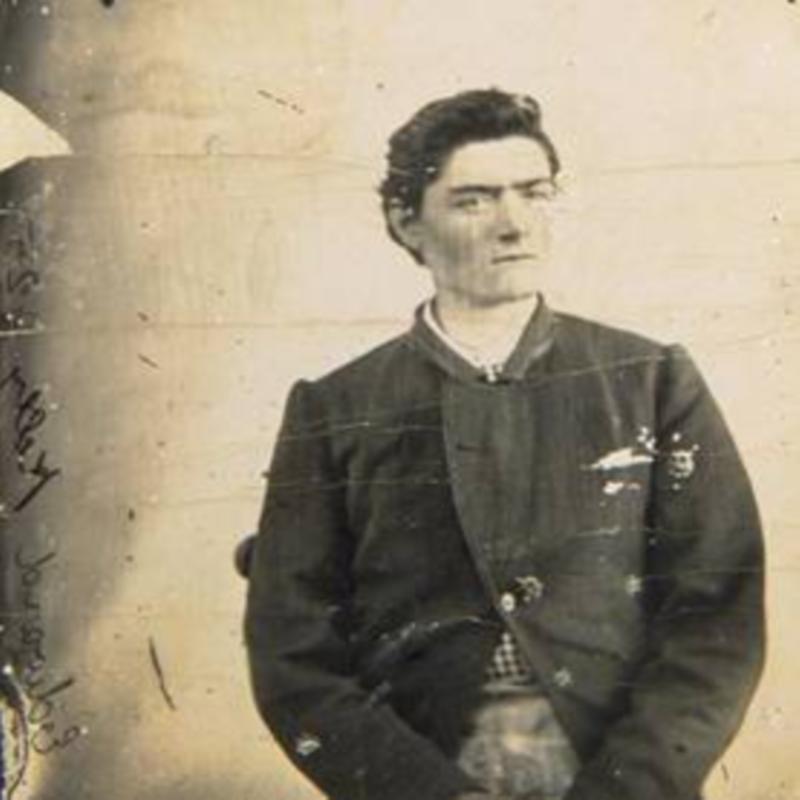
Edward “Ned” Kelly was born in June 1854, in the town of Beveridge near Melbourne, one of seven children. His father John “Red” Kelly had been deported to the Antipodes from his native Ireland following a criminal conviction. The precise nature of his crime remains uncertain, some suggest that he was involved in Irish nationalism and that his conviction was politically motivated others that he stole some pigs. Regardless of the crime in 1843, he was sentenced to 7 years penal servitude and transported to Van Diemen’s Land or modern-day Tasmania. Released from his sentence in 1848 he travelled to Victoria in Australia where settling in Beveridge he worked on a nearby farm later marrying his employer’s daughter, Ellen Quinn.
“Red” Kelly did not take kindly to authority and the police were antagonistic towards both him and his family. They were suspected of being cattle rustlers and horse thieves. In fact, there was barely a crime committed locally for which they were not held to blame.
In early 1866, “Red” Kelly was arrested for supposedly stealing a calf and removing its brand. Though he was subsequently cleared of theft he was nonetheless convicted of removing the brand with the intention of selling the calf on; and the sentence was harsh, he was ordered to pay a £25 fine or face six months hard labour. Unable to pay the fine he was made to serve his sentence in the unforgiving environment of Kilgore Jail – it destroyed his health. Not long after his release on 27 December 1866, he died. Ned, aged 11 at the time, was heartbroken and blamed the police for his father’s death and he was later to become convinced that they were out to get both him and his family.
Long before Ned ever became an outlaw from justice members of his family were arrested a total of 18 times, though fewer than half of these ever to lead to a conviction. This has led many to believe that the Kelly family were unfairly targeted and that they were the victims of police harassment.
Ned who was physically strong and revelled in the rough and tumble of the outdoor life enjoyed a good fist fight and was frequently in trouble.
Despite a growing reputation as a dishonest bully, he was for a time at least a local hero when he saved another boy, Richard Shelton, from drowning. Indeed, he was awarded a green sash by the boy’s family in recognition of his courage. It was something he was to remain very proud of for the rest of his life.
On 15 October 1869, aged 14, Ned was arrested for the first time accused of beating and robbing a Chinaman, Ah Fook. It was Fook’s word against Ned’s, and of course the police believed Fook. Ned was after all a Kelly.
Ah Fook spoke little English however, and the police failed to provide an adequate translation of his accusations and as a result Ned was cleared of the charge. Even so, the man who had arrested Ned and brought the case to Court, Sergeant Tom Whelan who had an intense hatred of the Kelly family now took it upon himself to put them under constant surveillance.
On 10 May 1870, Ned was arrested again on three counts of highway robbery, a serious offence that could in some cases lead to the death penalty. But none of the victims identified Ned as the man who had robbed them. The police claimed that the Kelly family had intimidated the witnesses into silence, but Ned was yet again cleared of all charges.
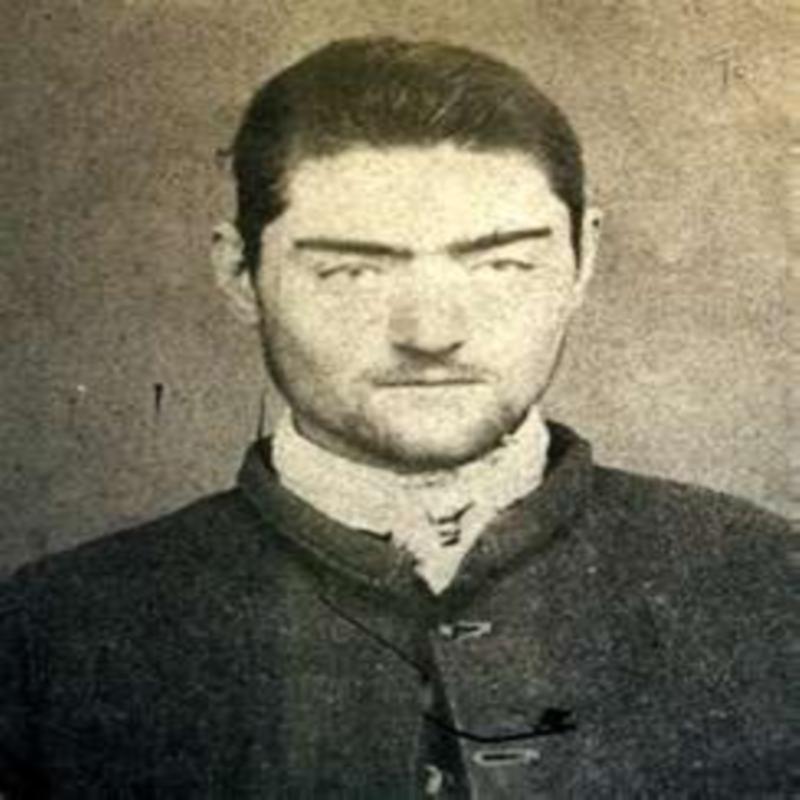
Later that year in October, Ned was arrested this time for assaulting a local hawker, Jeremiah McCormack whom he accused of stealing his friend Ben Gould’s horse. On this occasion he was sentenced to three months hard labour. Not long after his release Ned was given a horse to take care of by a friend. He used this horse to ride to the nearby town of Wangaratta where Police Constable Thomas Hall recognising that the horse had previously been reported as stolen tried to arrest him. A fight soon broke out and Constable Hall, who was being worsted in the exchange of blows drew his gun and fired two shots at Ned both of which missed. He was then overpowered by Ned who proceeded to humiliate him by riding him down the main street like a horse to howls of derision and the jeers of the crowd.
Ned was later arrested, along with his friend Alex Gunn, and sentenced to three years imprisonment for the receipt of stolen goods while the man who had stolen the horse, Isaiah “Wild” Wright received only eighteen months. Ned was furious that Wright had not confessed to the charge and cleared him and Gunn of any responsibility. Upon his release he badly beat up Wright in a pre-arranged 20 Round bare-knuckle fist fight. In the meantime, the harassment of the Kelly family continued and his younger brothers, Jim, aged 10 and Dan, aged 12, were arrested for theft but later released. Two years later Jim was charged with cattle rustling and sentenced to five years.
In September 1877, the police tried to arrest Ned for being drunk and disorderly. A fight ensued and four policemen were injured before Ned was eventually subdued; whilst he was in captivity Constable Lonigan black-balled him squeezing his testicles very hard for a prolonged period of time. Once he had regained his breath and his composure, Ned said to the policeman, “If I ever shoot a man Lonigan, it’ll be you.”
On 15 April 1878, Constable Alexander Fitzpatrick stumbled into a police station claiming that he had been assaulted and shot in the wrist by Ned Kelly and his brother Dan. When questioned about the incident the Kelly’s stated that Fitzpatrick had visited their home and made suggestive remarks to Ned’s sister, Kate. The Kelly boys, angry at his behaviour, knocked him to the ground and it was then that he damaged his wrist. Once things had calmed down they proceeded to bandage his injured wrist and he left saying that no harm had been done. Despite the evidence of alcohol on his breath and being unable to produce any corroborating evidence Fitzpatrick was believed.
On 9 October, Ned’s mother Ellen, his brother-in-law Bill Skillion and his friend Bricky Williamson were arrested and charged with attempted murder. Ned and his brother Dan, not believing they would get a fair trial went into hiding. They were later joined by their friends Steve Byrne and Joe Hart. A few years later, Constable Fitzpatrick upon whose evidence the Kelly’s now stood accused would be dismissed from the force for drunkenness and perjury.
On 25 October, Sergeant John Kennedy accompanied by Constables McIntyre, Scanlon and Lonigan set off in pursuit of the fugitives. A further party also set off hoping to trap Ned and his gang in the Wombat Mountains near the town of Mansfield, Victoria.
The police detachment set up camp near Stringy Bark Creek and not long after Sergeant Kennedy and Constable Scanlon left to scout the surrounding area. Unknown to the police however they had already stumbled upon the Kelly Gang located just a mile away. As Constables McIntyre and Lonigan amused themselves by taking pot-shots at the local wildlife, Ned, hearing the commotion set off in search of the camp. He was hoping to take the policemen by surprise, overpower them and seize their arms. In this at least they were to be entirely successful.
The surprise was total, upon hearing their approach Constable McIntyre immediately threw away his gun and raised his arms in surrender. Constable Lonigan perhaps remembering Ned’s previous threat went for his pistol and was shot dead. The gang were to remain in the camp for several hours while they awaited the return of the other policemen. During this time Constable McIntyre was ridiculed as a coward, decried as a traitor to his people and condemned as being a tool of the English but he remained physically unharmed.
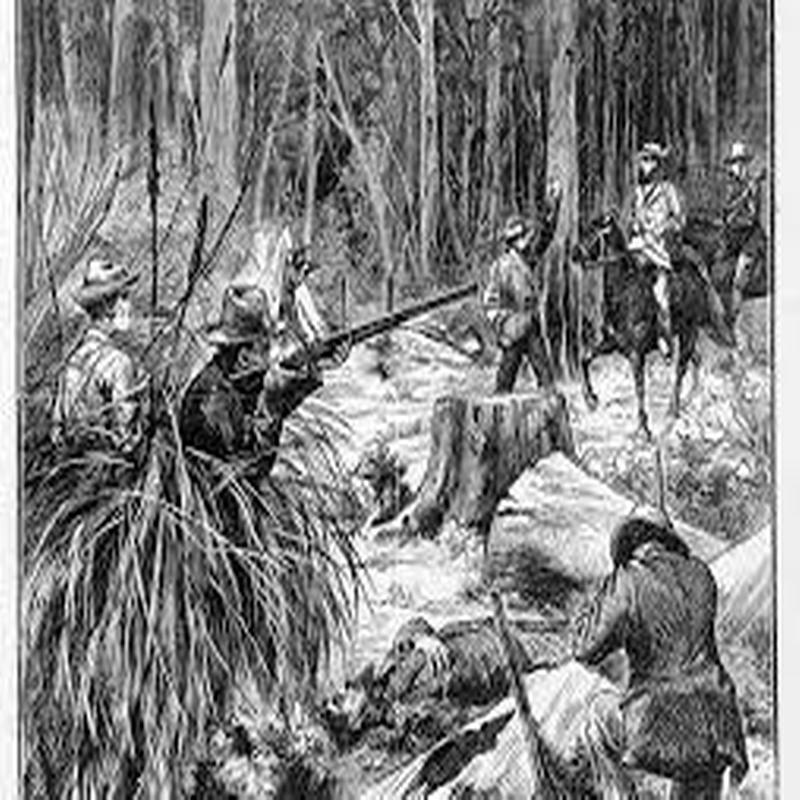
As the sun began to set the absent policemen returned to the camp and McIntyre called upon them to surrender as he had. They refused but as Constable Scanlon set himself to fire upon the camp he was cut down. Witnessing the death of Scanlon, Sergeant Kennedy now fled into the woods firing as he went and with Ned in hot pursuit. They ran for some distance before Kennedy collapsed to the ground. He had been mortally wounded by a shot to his back. As he lay there breathing his last Ned was seen to lean over his body for some time appearing to speak to him before he relieved him of his gold fob watch.
Ned knew the murders at Stringybark Creek put them beyond the law and that if caught they would not get a fair trial. It was now all or nothing, they were Outlaws.
On 10 December 1878, the Kelly Gang robbed the bank in the town of Euroa. Hostages were taken and held at the local Railway Station while the bank was stripped of £2,260. No one was hurt and the entire affair was treated as something of an adventure. The hostages exchanged jokes with their captors and were in turn royally entertained by displays of horseback riding. The Authorities however were not so amused however, and a massive reward was offered for information leading to the arrest of the notorious Kelly Gang described as bandits, thieves and cold-blooded murderers.
On 8 February they struck again, this time in the town of Jerilderie and their modus operandi remained the same, hostages were again taken, and the two local policemen locked up in their own cells. The gang then indulged themselves in a bit of fun as they dressed up in police uniforms and rounded up the locals imprisoning them in a nearby hotel. They acting, they said, in the name of the law. Ned particularly enjoyed telling them how he was in pursuit of the wicked and evil Ned Kelly – the Terror of the Outback. He then proceeded to burn the townspeople’s mortgage deeds.
Having robbed the bank and with time on his hands he decided to write a long letter outlining his grievances. His family, he wrote, had long been singled out for harassment and intimidation. But this was not just the case for the Kelly’s alone but for all Irish Catholics who were oppressed by a predominantly Protestant Irish Police Force and the English Political Establishment they served. The letter he then sent to the press, but it was never published. It was bad enough that Ned Kelly was already being perceived as the Australian Robin Hood without him also becoming an Irish nationalist hero. The reward for the arrest of him and his Gang was now increased to £8,000.
Aware that her brother’s life was now in danger, Ned’s sister, Kate tried to negotiate a safe passage for him and the others to America. She managed to get them a berth on a ship bound for New York, but the plan had to be abandoned when the police got wind of it. In the meantime, Ned was becoming increasingly paranoid. He could not understand how the police always seemed to be aware of his whereabouts. He believed that the Gang were being betrayed by someone close to them.
On 26 June 1880, Dan Kelly and Joe Byrne believing that an associate of theirs, Aaron Sherritt, had been betraying them to the police (he was indeed an informant) paid him a visit and chased him through the house before finally catching up with him and shooting him dead. The four policemen also in the house at the time hid under their beds and did nothing to protect him. The following day the Kelly Gang arrived in the town of Glenrowan with more than the intention of just robbing it.
Whether Ned believed that his time was running out or he was still aggrieved that his mother had not yet been released from prison he now determined to take the fight to the Government. He planned to ambush a large detachment of police that was due to arrive by train in the town early the next morning and kill as many of them as he could.
He took around 70 townspeople hostage and kept them in the local Inn where they were plied with drinks to keep them compliant. In the meantime, the rest of the gang tore up some of the tracks to ensure a derailment. So determined was Ned to confront the police that he even designed and had made special body armour for himself and his men. This was thick enough to repel bullets and each was provided with a helmet. The armour however did not extend beyond their knees and left their legs exposed.
The plan began to unravel when Ned mistakenly released a prisoner, the schoolteacher Thomas Curnow who had been feigning illness. He was aware of what Ned was planning and was to stop the train just before sunrise by standing on the tracks and waving a lantern.
Informed that Ned and his Gang were in the Inn the police now laid siege to it. No one knows for sure who fired the first shot but not long after daybreak a fierce firefight broke out. It appears that no warning was shouted for Joe Byrne was shot dead as he was standing at the bar pouring himself a whisky. Dan Kelly and Steve Hart returned fire. Ned, who had been away had only just returned was still dismounting from his horse when the firing began.

Seeing the police in the distance and wearing full body armour covered by a long grey coat he began to advance towards them firing his rifle as he went. He was struck numerous times by bullets to his head and body which staggered him but failed to penetrate the armour. As he continued to advance on the police lines, they unable to stop him began to panic. He wounded the policeman Francis Hare who then ran away and seeing this, others began to follow. He was to get within 50 yards of the police when seeing that his legs were unprotected the order was given to fire at them. Shot many times he still did not collapse to the ground until hit by a shotgun blast in the chest from close range.
Ned Kelly, his legs a bloody mess, was taken prisoner. As the armour was stripped from his body, he was found to be wearing the green sash he had been awarded all those years earlier for saving a boy’s life.
The police continued to fire upon the Inn until it was finally set ablaze. Once the fire had subsided enough for the police to enter, they found Joe Byrne, Dan Kelly, Steve Hart and two of the hostages dead from bullet wounds. The others had fled.
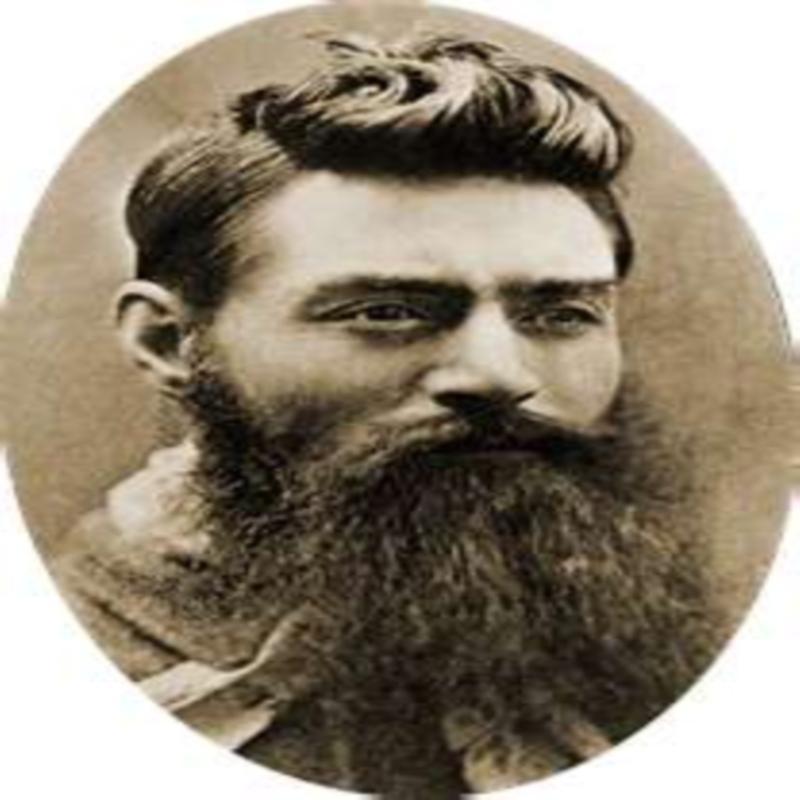
Ned was at first imprisoned in Melbourne to await trial but fearing trouble the Authorities removed him to the small town of Beechworth for his committal proceedings.
If they thought isolation in Beechworth would see the ‘Kelly Case’ fade from public view they were sorely mistaken for events had already spiralled beyond their control – Ned had become a cause celebre and he was not shy in exploiting his new-found fame writing letters, posing for photographs and even growing an extravagant beard to emphasise his status as the flamboyant rebel hero.
His sister, Maggie also tried to exploit his fame to raise funds for his defence but she was never able to raise enough money for the prominent lawyer she sought many of whom baulked at defending the man responsible for the brutal slaying of three police officers and so Ned’s Defence Counsel was to prove inadequate to the task and he was to lament the fact that he had not been permitted to defend himself.
On 28 October 1880, Ned was returned to Melbourne for trial where the presiding judge would be Sir Redmond Barry, a fellow Irishman who had long held a grudge against the Kelly family.
It was admitted in Court that the police had harassed the Kelly’s and had long wanted to see Ned hang regardless of any offence. This appeared to bear out the belief that Ned had only acted under extreme provocation but the facts facing the Court were stark. He had not only held large numbers of people against their will and carried out robberies on a large scale but had also killed three policemen in cold blood with the intention of killing many more. The jury were to deliberate for just 25 minutes before passing their verdict of guilty.
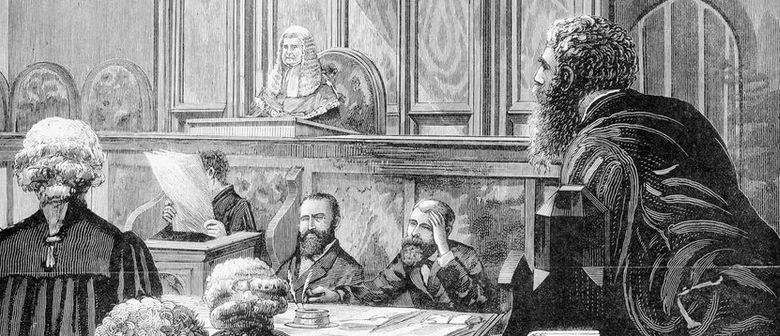
During his own testimony Ned and Judge Barry were to debate the facts surrounding the case in an informal manner that is almost as famous as the deeds themselves. They were old antagonists who were obviously enjoying the cut and thrust of their argument. Ned defended himself well but knew it would make no difference to the sentence, and Judge Barry took obvious delight in passing it:
“Edward Kelly, I hereby sentence you to death by hanging. May the Lord have mercy on your, soul.” Ned replied, “I will see you there, soon enough.”
A petition was started to have Ned’s sentence commuted to life imprisonment. It was to gather 30,000 signatures, a massive total in the small Australian population of the time but it failed to move the Authorities.
Ned Kelly was hanged in Melbourne Jail on 11 November 1880. His mother’s last words to him were, “Mind you die like a Kelly.” His own last words were, “Such is life.”
Judge Barry was to die of natural causes just three months later.
Tagged as: Miscellaneous
Share this post:





